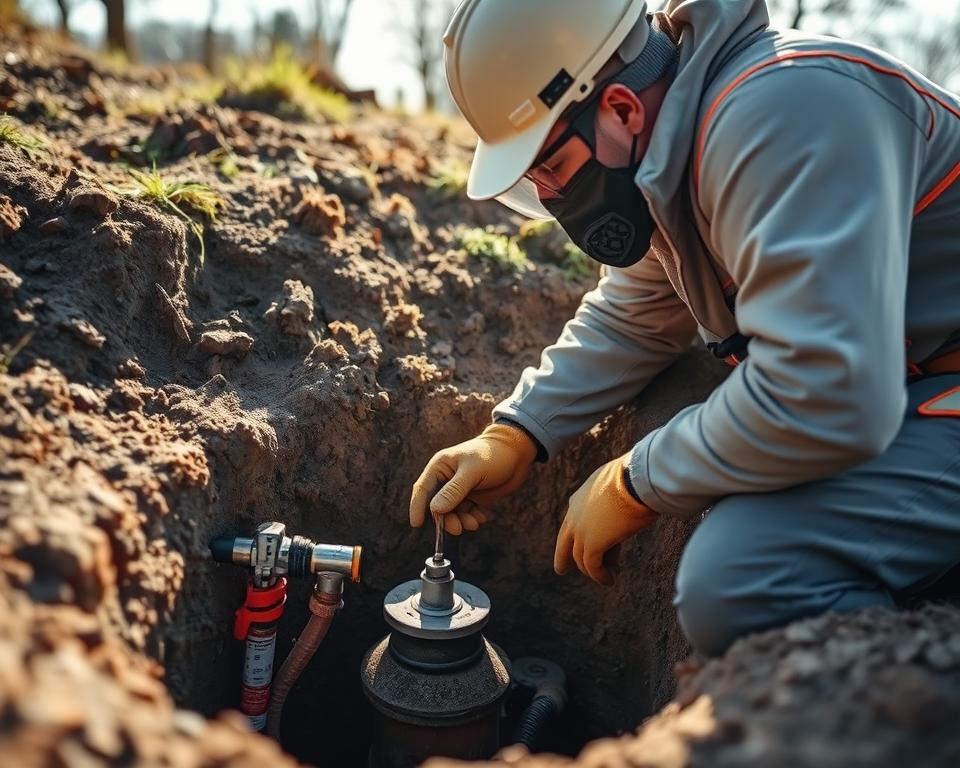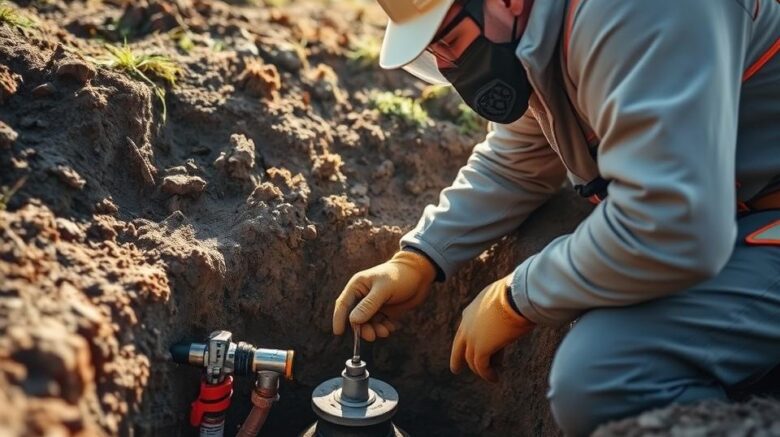Septic System Pumping
Have you ever wondered how often you should set up septic system pumping so you can dodge expensive malfunctions? With over 20 percent of U.S. households depending on septic systems, grasping their maintenance is vital. Pinpointing the right time to book a septic tank service is key to its lifespan. Moreover, you can find budget-friendly septic pumping solutions that deliver top-notch functionality without overspending. This guide covers essential upkeep advice useful for every homeowner.
Core Takeaways
- Regular septic system pumping is essential for optimal performance.
- Recognizing the indicators that signal the requirement for service can head off major issues.
- Selecting qualified septic system pumpers ensures quality maintenance.
- Budget-friendly septic pumping alternatives are accessible for homeowners.
- Regular inspections promote peak system performance.
Getting to Know Your Septic System
A septic system serves a crucial role in processing household wastewater, consisting of several essential components that operate collectively. The initial drain line channels wastewater from your home to the septic tank, where the process starts. In the tank, an underground chamber, solids sink at the bottom, and bacteria break down these solids, processing the waste efficiently.
The clarified liquid effluent next travels from the septic tank to the distribution box, where it is dispersed evenly across the drain field or leach field. Here, the soil continues the filtration, continuing to purify the wastewater. Understanding the functions of these septic system parts is vital. It allows homeowners to oversee and upkeep their systems properly.
Knowing how your septic system operates allows you to take preventive maintenance measures. It’s advisable to have periodic meetings with professional cleaners of septic systems – septic pumping cost. They provide crucial insights for peak operation of your system. These professionals aid in arranging the required pump-outs and checks. This attentiveness can significantly prolong your septic system’s lifespan.
Importance of Septic System Maintenance
Keeping your septic tank regularly is key for homeowners who want their system to remain reliable. A well-cared-for system offers peace of mind and protects your property’s value. Without appropriate care, you’re facing system breakdowns and health dangers.
Selecting a first-rate septic pumping service is crucial. They deliver timely inspections and pump-outs, removing sludge and scum buildup. If maintenance is ignored, emergency pumping may be required, which is pricey.
Sticking to a steady maintenance plan is wise. It entails professional evaluations and regular pumping. This proactive measure prevents urgent issues, ensuring a safer living environment for everyone.

Warning Signs for Septic Systems
Staying mindful of septic system issues can prevent costly repairs and major damage. Typical signs indicate when your system demands a check. These include:
- Slow drains throughout the house
- Pooling water in the yard above the drain field
- Foul odors near the septic tank or leach field
- Remarkably lush grass growth in particular areas of your yard
These symptoms could signify problems that might result in your system failing. Acting quickly is critical. Contacting septic pumping experts for an inspection assists. Early intervention stops small issues from becoming large ones. Additionally, regular upkeep guarantees your system works well and has a longer life.
Best Practices for Septic System Pumping
Correct pumping of your septic tank is essential to sidestep expensive clogs and backups. It’s vital to establish the right interval for maintenance. Homeowners should usually plan pumping every 2 to 5 years, depending on the tank’s size and household wastewater levels. Frequent use of garbage disposals may demand more frequent pumping.
Using experienced pumpers means your tank gets a full clean and check-up. During pumping, specialists look for any issues, such as broken baffles. Finding these problems early prevents costlier expenses and inconveniences later. Scheduled pumping schedules and expert help provide your septic system’s trouble-free operation.
Routine Inspections for Optimal Performance
Regular inspections are essential for your septic system’s effectiveness. Septic system inspections uncover minor issues before they worsen. Experts advise inspections every three to five years, influenced by system size and household usage. This prevents expensive fixes.
Keeping maintenance records is important for monitoring your system’s condition. These records give insights into previous inspections, repairs, and suitable intervals to schedule septic tank cleaning services. With this information, organizing for future upkeep becomes simpler, retaining septic systems in optimal shape.
Frequent inspections and detailed record-keeping not only enhance system efficiency but also lengthen its life. This approach protects the environment and the investment in a safe, operational home.
| Inspection Type | Recommendation Frequency | Benefits |
|---|---|---|
| Visual Inspection | Annually | Identify surface issues |
| Professional Inspection | Every 3–5 years | Assess functionality and detect problems |
| Septic Tank Pumping | Every 3–6 years | Prevent overflow and system failure |
Efficient Water Usage to Extend Septic Life
Smart water use is key for keeping your septic system robust. It not only helps the environment but also enhances the performance of your home’s plumbing. By practicing straightforward, yet effective, conservation methods, homeowners can reduce wastewater.
Stagger your laundry activities over the week instead of running back-to-back loads. This helps the septic system to manage water better and avoids tank overflow. Choosing low-flow fixtures in your kitchens and bathrooms produces considerable water savings, keeping the water pressure up while cutting the flow rate, thus diminishing the amount of wastewater produced each day.
Quickly fixing leaks is another practice to assist your septic system. Even a small leak can cause a large waste of water, putting extra pressure on the septic system. Through periodic inspections and repairs, you materially improve the system’s efficiency.
Focusing on water conservation isn’t just advantageous for your septic system; it’s also a step towards environmentally responsible living. Making such practices into your daily routine helps both your household and the planet.
Managing Household Waste Correctly
Homeowners play a vital role in maintaining their septic system’s health by disposing of household waste appropriately. It’s critical to avoid flushing non-biodegradable items like wipes, plastics, and other harmful products in the system. These items can trigger clogs, leading to costly repairs and a decrease in efficiency.
Converting food scraps and organic materials is a helpful alternative to throwing them in the trash. This practice markedly lowers the amount of solid waste entering the septic tank. Focusing on biodegradable waste disposal preserves the ecological balance needed for effective waste management.
It’s vital to monitor what goes down the drains. Non-decomposable items can requiredemand more frequent septic tank pumping. By grasping and adhering to correct waste disposal methods, you can ensure a more efficient and long-lasting septic system.
Choosing Septic-Friendly Cleaners
The health of your septic system depends significantly on your choice of cleaning products. Opting for septic-safe cleaning products is paramount. These products shield the balance of beneficial bacteria that decompose waste. Many standard cleaners have harmful chemicals that jeopardize this balance, causing costly repairs or system failure.
Homeowners should consider natural alternatives that are both effective and environmentally friendly. Common household items like baking soda, vinegar, and lemon juice are great choices. These natural cleaners are not only good at cleaning but also support your septic system’s health.
Avoiding products that contain antibacterial agents and chlorine bleach is crucial. Such substances damage the essential good bacteria, compromising your system’s functionality. By picking sustainable products, you secure both the efficiency and longevity of your septic system.
The Role of Bacteria in Your Septic System
Bacteria perform a key role in keeping your septic system functional. They decompose solids on their own and improve nutrient processing. A lack of healthy bacteria can cause system failure, bringing about hefty repairs.
Homeowners can improve their system by introducing organic additives. These products increase beneficial bacteria, making waste decomposition more effective. It’s important to select organic additives that are beneficial, not harmful, to the septic environment.
A healthy bacterial community is key to a septic system’s longevity and efficiency. It avoids solid buildup and cuts the need for frequent pumping. Prioritizing bacterial health ensures waste management more effective and eco-friendly.
Wrapping It Up
Septic system care is vital for the durability and functionality of your home’s wastewater system. Sticking with critical maintenance tips prevents hefty repairs. Grasping routine pumping and inspections is paramount. This ensures your septic system stays in peak condition.
Becoming knowledgeable of your septic system’s operation and proper methods in water and waste management is crucial. Engaging professionals like All in Sanitation provides expertise. This supports your septic system’s long-term health and provides confidence.
Investing in proper septic maintenance today delivers future benefits. It safeguards your home and improves your family’s quality of life. Emphasizing septic system care gives certainty with a well-maintained system.
